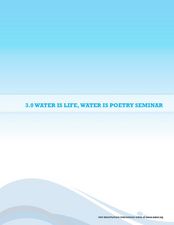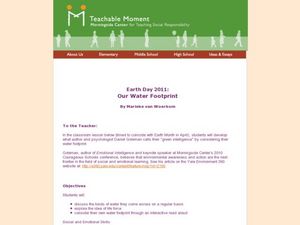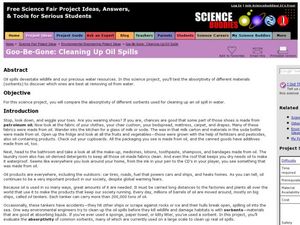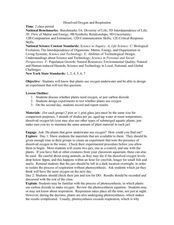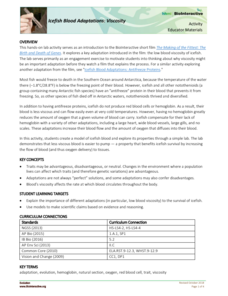Curated OER
Global Change: Where Land, Air and Water Meet
Students discuss the atmosphere as a mixture of gases. In this science lesson plan, students explore the world's oceans and fresh waters understanding that there are dissolved chemicals. Students realize that many substances dispersed in...
Curated OER
Water Cycle
Third graders observe the changes that occur in the water cycle after doing a water cycle demonstration in a plastic bag. In this water cycle lesson plan, 3rd graders reflect on what they see and identify the stages.
Curated OER
Water Awareness Portfolio Instructions
Students participate in a water awareness portfolio. In this water conservation lesson students create a portfolio to help make them aware of current water conditions.
Curated OER
Water Quality Assessment
Students evaluate water quality of different sources. In this water assessment instructional activity students chemical testing, identify biological factors in the stream, and write a paper on their position of the stream's...
Curated OER
Water, Water, Everywhere and Always on the Move
Students create their own water cycle in a terrarium. In this water cycle lesson, students research the water cycle and complete a worksheet using the Internet. They create a water cycle of their own in a jar with stones, sand, soil, and...
Curated OER
Are You a Water Waster?
Students determine what it means to be water wasters. In this water conservation lesson, students follow the provided procedures to identify how much water is used in their household when people brush their teeth.
Curated OER
Teaching About the Properties of Water
Students use video, Internet research, graphs and tables, worksheets and hands-on experiments to investigate the properties of water in a lake environment. They work under direction or through an inquiry process.
Curated OER
Water Words Puzzle
In this water worksheet, students fill in the blanks to a crossword puzzle having to do with water words. Students complete 25 blanks in the crossword.
Curated OER
Water is Life, Water is Poetry Seminar
Students participate in a discussion about water and create water-inspired poetry. In this poetry lesson, students demonstrate a memorable experience involving water by constructing a poem.
Curated OER
Our Water Footprint
Students discuss the water usage of the world and their own water usage. For this water lesson plan, students read a story about water and discuss different statistics of water usage around the world.
Curated OER
Bodies of Water
In this writing descriptive sentences worksheet, students describe 13 different bodies of water using the words small, large, fresh, salt, deep, shallow, protected, still, and flowing. Students should include 2 adjectives per sentence.
Curated OER
Water Lesson Plan
Young scholars discuss the importance of water in our daily lives. In this physics lesson, students calculate the pressure of water tower systems. They investigate the effect of certain variables using a computer simulation.
Curated OER
A Whale of a Story
Does sound travel faster in water or in the air? Put the question to the test with a science experiment. After reviewing a table of data, third and fourth graders decide which statements are true and which ones are false. The bottom of...
Virginia Department of Education
Changes in Ecosystems
How does water pollution affect the environment? Provide your class with the resources to answer this question as they learn about eutrophication and ecosystem changes. Over two weeks, they simulate the effects of pollution on the...
Foundation for Water & Energy Education
How Can Work Be Done with Water Power? Activity C
Third in a set of lessons regarding reservoirs, dams, and hydropower, this involves a two-day hydropower plant simulation. Collaborative groups build, maintain, and finance the plant. The transparency of the reservoir setup can be...
Sargent Art
Protect Our Marine Life
Encourage water conservation and boost art skills with a hands-on activity that challenges young painters to create a scene highlighting marine life. Using oil pastels, scholars draw an underwater scene and write a tip for viewers to...
Curated OER
Cleaning up an oil spill
Small groups complete a science project involving cleaning up an oil spill. In this experiment, pupils use 4 different sorbents to discover which one absorbs the most oil. Afterward, they make a data table.
DiscoverE
Clean It Up
Water, water, everywhere, but not a drop to drink—until we clean it, of course! Scholars design a filtration device that removes pollutants from water. The goal is to have the water come out as clean as possible from the device. How...
American Chemical Society
Using Dissolving to Identify an Unknown
There is a solvent called aqua regis that can dissolve gold! After observing a solubility demonstration, groups receive four known crystals and one unknown. Based on the demo, they design an experiment to determine the identity of the...
US Environmental Protection Agency
A Mock Town Meeting on a Proposed Tank Farm
Intended as a follow up to the Protecting Your Drinking Water activity, young environmentalists use their assessment of the a hypothetical town's water supply to debate the installation of underground chemical storage tanks. With...
CK-12 Foundation
Least Time
What is the fastest way to get from point A to point B if you are going through two different mediums, such as air then water? Scholars explore the way light travels through air, water, acrylic, glass, and diamond as they answer this...
Curated OER
Dissolved Oxygen and Respiration
Students are presented with the question, "Do plants that grow underwater use oxygen?" They create an experiment to test the presence of dissolved oxygen in the water using provided materials. Student experiments include a control jar as...
Howard Hughes Medical Institute
Icefish Blood Adaptations: Viscosity
Most fish freeze to death when the water is too cold, yet some fish live in the Southern Ocean where the water is often below freezing. Scholars use two models representing the blood from most fish versus the blood from Antarctic fish....
National Science Teachers Association
Using Concept Maps in the Science Classroom
A good concept map requires high thought processes. This makes it a great tool for teaching and evaluating your pupils. A helpful article describes a great approach for teaching young scholars the art of concept map building and how best...










